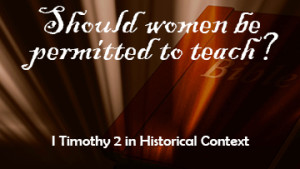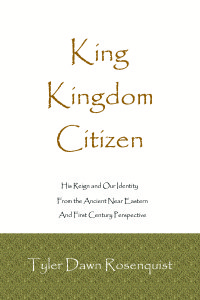 From my book The Bridge: Crossing Over Into the Fullness of Covenant Life.
From my book The Bridge: Crossing Over Into the Fullness of Covenant Life.
In my previous article, I spoke about what scholars are calling the New Roman Woman and I am only going to briefly address her here. I ask you to read the previous post in the series because if you don’t, or haven’t, this really isn’t going to be as helpful for you.
The New Roman Woman was a radical departure from the ideal Roman matron – who, instead of being virtuous and industrious, was nothing short of a lazy cougar accumulating young lovers in a scandalous fashion. Much needed changes to Roman laws concerning a woman’s right to keep what she brought into and earned during her marriage resulted in a dramatic culture shift. Married upper class Roman women as well as wealthy young war widows were shunning the traditional fashions and mannerisms of virtuous women and were instead dressing and behaving like hetairai – high class prostitutes. Not only that, they were studying philosophy with their brothers and actually speaking up during dinner parties – but speaking up wasn’t the problem, it was how they were speaking up. They were not content to be a part of the conversation, but instead were bent on dominating and controlling the conversation, to the horror of the men. It was a terrible scandal.
Now, I have to tell you a bit about what precipitated this – in Rome it was always illegal for a woman to commit adultery, but it was expected for a man to do so. Men could pretty much do as they wanted, as long as they did not do it with a Roman citizen. So both male and female lovers were all on the table, just so long as the men were on the, well, “giving” end of the arrangement and not the “receiving” end – and as long as their “lover” was a foreigner, a peasant or a slave. Roman citizens were considered a sacred people and not to be shamed in any way – and the effeminate half of the sexual relationship was considered to be shameful. Wives were perennially expected to put up with this sort of behavior, and so when the laws changed that gave women some much needed financial freedoms, but some took things too far.
Now, Roman culture was very progressive with respect to women as compared with Greek (Greek women could not generally even leave their homes or be seen by men unless that man was a relative), giving women the freedom to learn, transact business, appear in court, and be benefactors – which is why we see that 20% of the people whom Paul named as early church leadership were women – from Junia the apostle and Priscilla the teacher, to Phoebe the deacon. In ancient Israel as well, women were sometimes in positions of leadership, from Deborah the prophetess who sat as a judge over Israel, to Huldah, after whom Jerusalem’s Huldah Gate was named, and Miriam, the sister of Aaron and Moses.
And yet in I Tim 2 we have this passage that seems to break with the obvious reality of women in church leadership in the first century:
likewise also that women should adorn themselves in respectable apparel, with modesty and self-control, not with braided hair and gold or pearls or costly attire, but with what is proper for women who profess godliness—with good works. Let a woman learn quietly with all submissiveness. I do not permit a woman to teach or to exercise authority over a man; rather, she is to remain quiet. For Adam was formed first, then Eve; and Adam was not deceived, but the woman was deceived and became a transgressor. Yet she will be saved through childbearing—if they continue in faith and love and holiness, with self-control.
What do we have here? We have a section of scripture firmly rooted in first century Roman Ephesus that makes no sense seen outside that culture. Ephesus was one of the “big dogs” in Roman Imperial cult – along with Pergamum and Sardis, Thyatira, Smyrna, Philadelphia and Laodicea. Those names should all sound very familiar – and although not found in Revelation, add Corinth to that list as well. These were cities that worshiped Caesars dead (and sometimes living ) as gods, a religious state in direct rivalry with the first century assemblies – and whom the first century assemblies had to set themselves clearly apart from.
likewise also that women should adorn themselves in respectable apparel, with modesty and self-control, not with braided hair and gold or pearls or costly attire, but with what is proper for women who profess godliness—with good works.
If you read my last post, you know that Roman dress codes were legally very strictly controlled. Who wore braided hair, gold, pearls and costly attire? No decent Roman woman would! Only the hetairai, the high class prostitutes (a perfectly legal and respectable profession, by the way, in ancient Rome) were permitted to wear such things – it told people exactly who they were, by how they dressed. Decent Roman women dressed very modestly and not at all in a fancy manner – not even the Empress. Wearing much jewels and gold was considered vulgar and whorish. What they were commanded to do, even by most of their own philosophers, was to be modest, self-controlled (not given to promiscuity) and to do beneficent works in the community as befit a decent Roman matron. In this, Paul agrees with many of the philosophers of his day – the women of Yeshua’s assemblies should do everything possible to appear respectable and should not dress according to the New Roman Woman fashions. But not only were these “new” women dressing like prostitutes, they were domineering the dinner party conversations as well, taking authority and acting boorishly. Might I suggest that some of these wealthy, upper class women were making their way into the assemblies of Yeshua?
Let a woman learn quietly with all submissiveness. I do not permit a woman to teach or to exercise authority over a man; rather, she is to remain quiet.
Now, because some women were abusively brash and whorish, there were some philosophers who (although some had no problems with the whorish part of the equation) did not want women to be able to learn at all. But Paul disagrees and says to let them learn! But, they were expected to behave the same way male students were commanded to learn – quietly and with submissiveness (we will talk about this sometime in the future, the 5th century teacher/disciple model of Greek philosophy). However, Paul has a caveat, just because women are learning does not mean that they should act like the disgraceful, boisterous, loud and obnoxious upper class educated Roman wives who were dominating their husband’s dinner parties, recognizing no authority but their own. There is no place for that in the churches – indeed, neither men nor women should behave so disgracefully.
According to Bruce W Winter, the verse literally reads “the wife in silence must learn in all subordination” (to her teacher during instruction). The gist of this prohibition was not in barring women from positions of teaching, but the prohibition of women from taking control over men in the domineering, authoritative, controlling and brutish way of the New Roman Woman (see Jonathan Brown’s comment below). Those who study the honor/shame culture of the ancient world will immediately see the problems inherent in a woman having any sort of power over a man in the First Century world. We can only imagine that Priscilla acted as a teacher in the best sense of the word – as a servant, as all teachers should be.
For Adam was formed first, then Eve; and Adam was not deceived, but the woman was deceived and became a transgressor.
This is an interesting side-step, leaving me to wonder exactly what those brash and boisterous women were pushing in the assemblies. Part of the gnosticism of the day involved the false picture of Eve:
After the day of rest Sophia sent her daughter Zoe, being called Eve, as an instructor in order that she might make Adam, who had no soul, arise so that those whom he should engender might become containers of light. ( On the Origin of the World, 115:31-35)
Could it be that these Ephesian women were not being allowed to learn alongside the men in the synagogues, and that as a result they had an incomplete knowledge of scripture which was being mixed with gnosticism? Could they perhaps have been preaching this? Indeed, often a little knowledge is worse than none at all and if they were not being allowed to learn then the danger for them being seduced by gnostic teachings from corrupt teachers (who were probably only too happy to gather up an audience of these rich woman) was very great indeed. Just a thought – I certainly can’t prove it. But partnered with the commandment to allow women to learn in the same manner as men, I think it is at least arguable.
Yet she will be saved through childbearing—if they continue in faith and love and holiness, with self-control.
One abhorrent aspect of the New Roman Woman that I have not yet covered was the desire to remain young looking in both face and figure at all costs. Coupled with their whorish nature, this naturally resulted in aborting unwanted pregnancies. We even have evidence of doctors refusing to perform them, and speaking of them with disgust! Indeed, Lucius Anneus Seneca, Governor of Achaia, wrote the following to his mother:
Unchastity, the greatest evil of our time, has never classed you with the great majority of women; jewels have not moved you, nor pearls; to your eyes the glitter of riches has not seemed the greatest boon of the human race; you, who were soundly trained in an old-fashioned and strict household, have not been perverted by the imitation of worse women that leads even the virtuous into pitfalls; you have never blushed for the number of your children, as if it taunted you with your years, never have you, in the manner of other women whose only recommendation lies in their beauty, tried to conceal your pregnancy as if an unseemly burden, nor have you ever crushed the hope of children that were being nurtured in your body; you have not defiled your face with paints and cosmetics; never have you fancied the kind of dress/a that exposed no greater nakedness by being removed. In you has been seen that peerless ornament, that fairest beauty on which time lays no hand, that chiefest glory which is modesty.
Childbearing – the virtue and honor of ancient womanhood, had become unfashionable. Indeed, women thought it to be their downfall in a world that had become obsessed with physical beauty. No longer were women seeking honor and virtue, but instead pleasures in this life. The belief system of that day and age involved a form of hedonistic platonism – where the body was the prison of the soul (according to Plato) but would be annihilated at death. Thus, pleasures were believed to be reserved for the living – who of course could neither experience them before birth or after death. Pleasure became a way to care for the soul during life, and since the body would be destroyed at death – well, the soul could hardly be punished for things that the body was responsible for. This hedonistic platonism had long been the playground of men, and now women were pursuing it as well.
Paul objects – and as he admonished those in Corinth who held to the annihilation of the body (presuming it would not be raised again), so he also admonishes Ephesian women. Childbearing is not the end of the world, far be it from the truth. In fact, giving birth to the children she conceived is in fact her deliverance from the evil temptations of the day.
In Summary, women in the Roman Empire were subject to four cultural problems – sexual revolution, the temptation to use education immodestly and boorishly, the converse of not receiving education at all and being at risk of deception, and the pressure to appear physically beautiful even at the cost of the lives of their unborn children. Paul addressed them all, and as in everything, we see that the lack of historical context has led to the oppression of women by those who would pick and choose which verses of scripture to build doctrines on – ignoring Priscilla, Phoebe and Junia – as well as Deborah, Huldah and Miriam and instead focusing on verses outside of time and context.
It is certainly not forbidden for women to teach, as Priscilla operated with the blessing and permission of Paul, who wrote of her often. In truth, we need more women teachers because women teach differently than men do – not better, but differently. We need balance, male and female, as it was in the beginning.
Two of my sources for this blog are very readable books that I recommend highly, both by Bruce W Winter
Roman Wives, Roman Widows: the Appearance of New Women and the Pauline Communities
After Paul Left Corinth
 So yesterday, I went on my facebook newsfeed – which I rarely do. It was uplifting as well as disheartening. If you know me on social media, I am sure you’ve noticed that I am incredibly grumpy this week – I have never been good at hiding my emotions.
So yesterday, I went on my facebook newsfeed – which I rarely do. It was uplifting as well as disheartening. If you know me on social media, I am sure you’ve noticed that I am incredibly grumpy this week – I have never been good at hiding my emotions.

